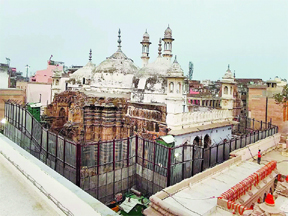
New Delhi (TIP)- The Varanasi district court on Friday, July 21, ordered an extensive survey of the Gyanvapi Masjid by the Archaeological Survey of India (ASI) to ascertain whether the mosque was built over a pre-existing Hindu temple, holding that the scientific investigation is “necessary” for the “true facts” to come out. Allowing an application by four Hindu women plaintiffs, district judge Ajaya Krishna Vishvesha directed ASI to conduct a comprehensive survey, using dating, excavation and ground penetrating radar (GPR) techniques, of the plot where the mosque stands, next to the Kashi Vishwanath Temple.
The court, however, ordered excluding the section which has remained sealed since the Supreme Court order in May 2022. The area under seal is where Hindus insist a Shivling has been found, while Muslims claim it is part of a fountain.
“The director of ASI is directed to conduct a detailed scientific investigation by using GPR Survey, excavation, dating method and other modern techniques of the present structure (mosque) to find out as to whether same has been constructed over a pre-existing structure of a Hindu temple,” stated the court order, seeking a report from ASI up to August 4 when the matter will be taken up next.
Dating is a method of calculating the age of very old objects while a GPR survey is a method of gathering data about what’s below the ground using ground-penetrating radar technology that sends electromagnetic energy signals into the subsurface. The order directed ASI to carry out GPR survey under the three domes of the mosque (where the plaintiffs claim there are remains of the pinnacle of a temple) and beneath the western wall (where the Hindu shrine of Shringar Gauri exists).
“The director of ASI is also directed to conduct GPR survey beneath the ground of all the cellars and conduct excavation, if required. The director of ASI is also directed to conduct dating exercise of the pillars and plinth of the building to find out the age and the nature of construction,” it added.
Permitting ASI to carry out scientific investigation of all the artefacts found in the mosque to find out their age and nature, the court further directed ASI to study all objects of historical and religious importance existing in different parts of the building and also beneath the structure which may be found during excavation. “The director of ASI is also directed to conduct GPR survey, excavation wherever required, dating exercise and other scientific methods for determining the age and nature of construction existing at the site in question,” said the court, adding that ASI must ensure that there should be no damage to the structure standing on the disputed land and that it remains intact and unharmed. Source: HT





Be the first to comment